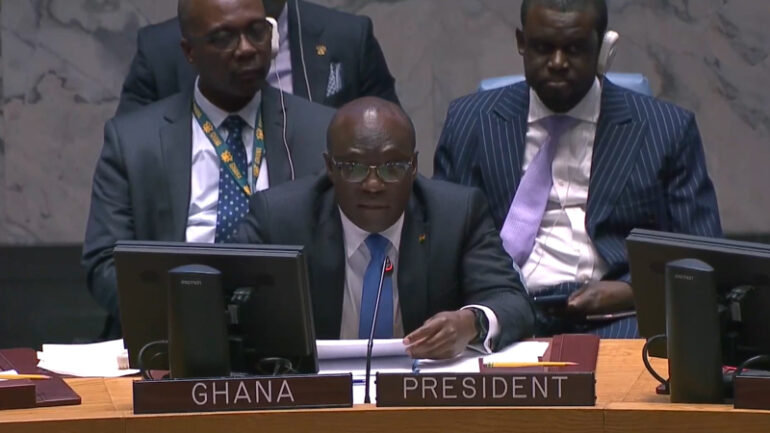UN Security Council Briefing on the Piracy in the Gulf of Guinea

At the outset, I would like to thank ASG Martha Ama Akyaa Pobee and Executive Director Ghada Fathy Waly for their briefings, which complement the Secretary-General’s report on the situation of piracy in the Gulf of Guinea. I also thank Ambassador Florentina Adenike Ukonga, Executive Secretary of the Gulf of Guinea Commission (GCC) and Commander Nura Abdullahi Yakubu, Maritime Planning Officer (PSOD) of the African Union Commission for their additional perspectives. We also thank the Peacebuilding Commission (PBC) for the Advisory Note issued for this meeting. The Security Council has since 2012 been an important enabler of global solidarity for combating piracy and armed robbery in the Gulf of Guinea region. The adoption of resolution 2039 in February 2012 ignited the actions that, today, reflect the maritime security architecture of the Gulf of Guinea.
We therefore believe that the adoption of resolution 2634 last May was an important reaffirmation of the Council’s commitment to strengthening maritime security in the region as the Member States of the Gulf of Guinea prepare for the 10th Anniversary of the Yaounde Code of Conduct. The indications from the international Maritime Bureau continue to show the Gulf of Guinea as the region with the worst record for piracy, despite the recorded decline in piracy incidents from 123 in 2020, to 45 in 2021 and a further drop to 13 between January and June this year. We also recognise the persisting challenges relating to inadequate staffing of the maritime coordination centers under the Yaounde framework, the lack of appropriate equipment and logistical support by national navies, as well as the sometimes ineffective exchange of information among participating countries.
It is in this context that we consider it important to sustain international policy focus on the security of the Gulf of Guinea through support for national and regional actions. We intend, in our statement, to highlight three main points: first, the need to strengthen the institutional framework; second, addressing the underlying drivers for piracy and armed robbery at sea; and third enhancing partnerships. On the question of institutional frameworks, regional and continental blueprints such as the Yaoundé Architecture and the 2050 Africa Integrated Maritime Strategy (AIMS) as well as the 2016 African Charter on Maritime Security and Safety and Development in Africa (Lomé Charter) have proven critical in mobilizing national actions to combat piracy and armed robbery at sea in the region. Their further implementation is however hampered by operational, logistical, funding, technical and capacity building gaps. For example, the lack of adequate material and logistical difficulties has delayed the establishment of the MMCCs in both Zones E and F as well as the operationalisation of the MMCCs in Zones A and G, under ECCAS and ECOWAS. Additionally, less than one-third of Member States have enacted legislation that criminalizes piracy to the full extent set out in UNCLOS. It is therefore important that these gaps be addressed to ensure effective institutions that can respond to the piracy menace.
With regards to the underlying drivers of piracy in the region, we note the increasing levels of poverty, high underemployment and unemployment, especially among the region’s youth, inadequate access to public services and other aggravating factors such as climate change and the disproportionate impact of Illegal, Unreported and Unregulated (IUU) fishing in the region. We advocate a multi-dimensional and whole-of-society approach in resolving such drivers, involving the private sector, civil society and donor partners. We encourage the integration of gender and youth perspectives into maritime security strategies and welcome interventions aimed at strengthening national efforts in building climate resilience and the protection of fishing areas of affected communities. We acknowledge the PBC’s intervening role in this regard and welcome its call on the private sector, including oil and mining companies, to enhance their Corporate Social Responsibility as well as technical assistance, and community-based support to vulnerable communities.
On enhanced partnerships, it is important that Member States in the region be supported to, among others, formulate their respective national maritime strategy and implementation plan and strengthen the investigative capacities of maritime law enforcement agencies. We commend the United Nations and its agencies such as the UNODC, International Maritime Organization (IMO), UNOCT as well as regional partners and friendly countries for their cooperation with regional initiatives and encourage more of such efforts. We recognise the invaluable support in realizing a safer maritime space in the region of bilateral and multilateral partners such as the European Union, the Group of Seven Group of Friends of the Gulf of Guinea (G7 ++ FoGG), Gulf of Guinea Maritime Collaboration Forum and Shared Awareness and De-confliction
(GoG-MCF/SHADE).
Lastly, even though the report did not identify empirical evidence of any links between the pirates and extremist groups, we urge coordinated efforts aimed at curtailing any potential linkages between extremist, terrorist, and pirate groups. At the national level, the Government of Ghana remains resolute in her commitment to implementing her obligations under regional and multilateral instruments aimed at combating the menace and we encourage other Member States to do same. The upcoming 10th anniversary of the Yaoundé architecture provides us with a unique opportunity to leverage the recommendations of the Secretary-General’s report towards enhancing the effective operationalization of the Yaoundé architecture including its codification. The direct and indirect cost of piracy and armed robbery in the Gulf of Guinea is too high for us to fail.
I thank you.
